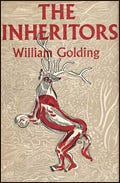Evocative and disturbing, The Inheritors portrays a fateful encounter some 27,000 years ago between a small clan of Neanderthals and a group of Homo sapiens. A parable about the cost of evolutionary progress, it’s a haunting tale of innocence destroyed, a prehistoric Paradise Lost set in a vivid, intricately realized European landscape toward the end of the last Ice Age.
As the weary members of a Neanderthal family reach their summer grounds after a perilous annual journey, they fail to recognize warning signs that they are not alone. They are gentle, nonviolent people, linked by an affectionate group consciousness, at one with themselves and their world. Taking no more than they need, they tread lightly upon the land. They are defenceless against a sudden, shocking attack by strangers who kill most of the adults and take the children as pets.
Only two are left, including the simple-minded Lok, through whose eyes we watch events unfold. Waiting in hiding for an opportunity to snatch the stolen children, they watch with amazement as the fascinating, dangerous “others” chatter, get drunk, make boats, draw pictures and practice shamanistic rituals. So closely do we identify with Lok that our own kind seem as alien to us as they do to him. Lok is a loveable clown, a child in an adult’s body. Confused and bewildered, he struggles to comprehend these predatory newcomers who have (so casually) shattered his familiar world; they “are like a famished wolf in the hollow of a tree”.
Short but intense, The Inheritors is multilayered, thought-provoking and underpinned by a universal mythic sensibility. The new humans have eaten the apple of knowledge; they have become self-aware, separate. Cast outside the circle of oneness that connects other living things, they fear the very world they live in and destroy all around them as they attempt to control it. We are the inheritors. Our inheritance, stained by the dark sin of Cain and bought by our brothers' blood, is the Earth. (1955; 240 pages)



